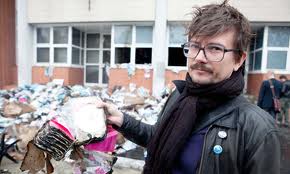
PARIS, Sept 19 — A French satirical magazine on Wednesday published a series of cartoons mocking the Prophet Muhammad, setting off a new wave of outrage among Muslims and condemnation from French leaders amid widening unrest over an amateur video that has provoked violence throughout the Islamic world. The illustrations were met with a swift rebuke from the government of François Hollande, which had earlier urged the magazine, Charlie Hebdo, not to publish the cartoons, particularly in the current tense environment.
“In France, there is a principle of freedom of expression, which should not be undermined,” Laurent Fabius, the foreign minister, said in a French radio interview. “In the present context, given this absurd video that has been aired, strong emotions have been awakened in many Muslim countries. Is it really sensible or intelligent to pour oil on the fire?”
In the interview on France Info radio, Mr. Fabius announced that, as a precaution, France planned to close its embassies in 20 countries on Friday, the Muslim day of prayer, which has become an occasion for many to express their anger although “no threats have been made against any institutions.” A Foreign Ministry spokesman said the closings would affect French consulates, cultural centers and schools as well.
In Egypt, representatives of the Muslim Brotherhood denounced the cartoons as blasphemous and hurtful, and called upon the French judiciary to condemn the magazine.
Mahmoud Ghozlan, a spokesman for the group, noted that French law prohibits Holocaust denial and suggested that similar provisions might be made for comments deemed blasphemous under Islam.
“If anyone doubts the Holocaust happened, they are imprisoned,” Mr. Ghozlan told Reuters. “It is not fair or logical” that the same not be the case for insults to Islam, he said.
Religious and political leaders in other majority Muslim nations also denounced the cartoons but called for calm. Tunisia’s governing Islamist party, Ennahda, warned believers against falling into a trap set by “suspicious parties to derail the Arab Spring and turn it into a conflict with the West,” Reuters reported.
Charlie Hebdo’s Web site was not functioning on Wednesday, the result of a computer attack, according to the editorial director, Stéphane Charbonnier. A Pakistani technology news outlet, ProPakistani, reported that a Pakistani hacker group claimed it had blocked the site because of its “blasphemous contents” about Muhammad. The violence provoked by the video disparaging the prophet began on Sept. 11 when a mob attacked the American Embassy in Cairo. The unrest quickly spread to Libya, where an attack on an American diplomatic mission in Benghazi claimed the lives of the American ambassador, J. Christopher Stevens, and three staff members.
On Wednesday, police officers were dispatched to guard the offices of Charlie Hebdo in eastern Paris.
The magazine’s headquarters, not far from its present offices, were gutted by a firebomb in November after it published a spoof issue “guest edited” by Muhammad to salute the victory of an Islamist party in Tunisian elections. Mr. Charbonnier, the editorial director, has been under police protection since.
Neither he nor the publication had received threats as a result of the most recent issue of the magazine, he said.
Prime Minister Jean-Marc Ayrault said the government would prohibit a series of protests that had been planned in several French cities for Saturday — one week after a group of around 250 people staged a largely nonviolent protest of the American-made amateur film, “Innocence of Muslims,” outside the American Embassy here.
“There is no reason for us to let a conflict that doesn’t concern France come into our country,” Mr. Ayrault told RTL radio. “We are a republic that has no intention of being intimidated by anyone.”
Mr. Charbonnier contested that decision, which he called “shocking.”
“The government needs to be consistent,” he said. “Why should they prohibit these people from expressing themselves? We have the right to express ourselves, they have they right to express themselves, too.”
In a statement, the main body representing Muslims in France, the French Muslim Council, expressed its “deep concern” over the cartoons and warned that their publication risked “exacerbating tensions and provoking reactions.” The council urged French Muslims to express their grievances “via legal means.”
Mr. Charbonnier said the weekly published the cartoons in defense of freedom of the press, adding that the images “would shock only those who wanted to be shocked.”
Gérard Biard, the magazine’s editor in chief, said: “We’re a newspaper that respects French law. Now, if there’s a law that is different in Kabul or Riyadh, we’re not going to bother ourselves with respecting it.”
This week as every other week, Mr. Biard insisted, “We’ve simply commented on the news.” The caricatures are meant to satirize the video that has stirred violence across the Muslim world, he said, and to denounce that violence as absurd.
“What are we supposed to do when there’s news like this?” Mr. Biard asked. “Are we supposed to not do that news?”
Known for its sharply ironic and often vulgar tone, Charlie Hebdo has a reputation for being an equal-opportunity provocateur. In addition to episode in November, the magazine was criticized for a decision in 2006 to republish cartoons of Muhammad that first appeared in a Danish newspaper.
In an editorial on Wednesday, Le Monde, France’s newspaper of record, defended the magazine’s right to publish what it pleases, within the limits of French law. But it called the most recent caricatures “in poor taste, or even appalling” and questioned the “sense of responsibility of their authors and editors.”
Mr. Charbonnier held firm.
“I’m sorry for the people who are shocked when they read Charlie Hedbo,” Mr. Charbonnier said. “But let them save 2.50 euros and not read it. That’s the only thing I have to say.
“They can’t hold us responsible for the closure of the embassies, they can’t hold us responsible for the violence and the deaths,” he said. “We’re not provoking anything.” Religious radicals can use “any pretext to start the fire,” he said.
